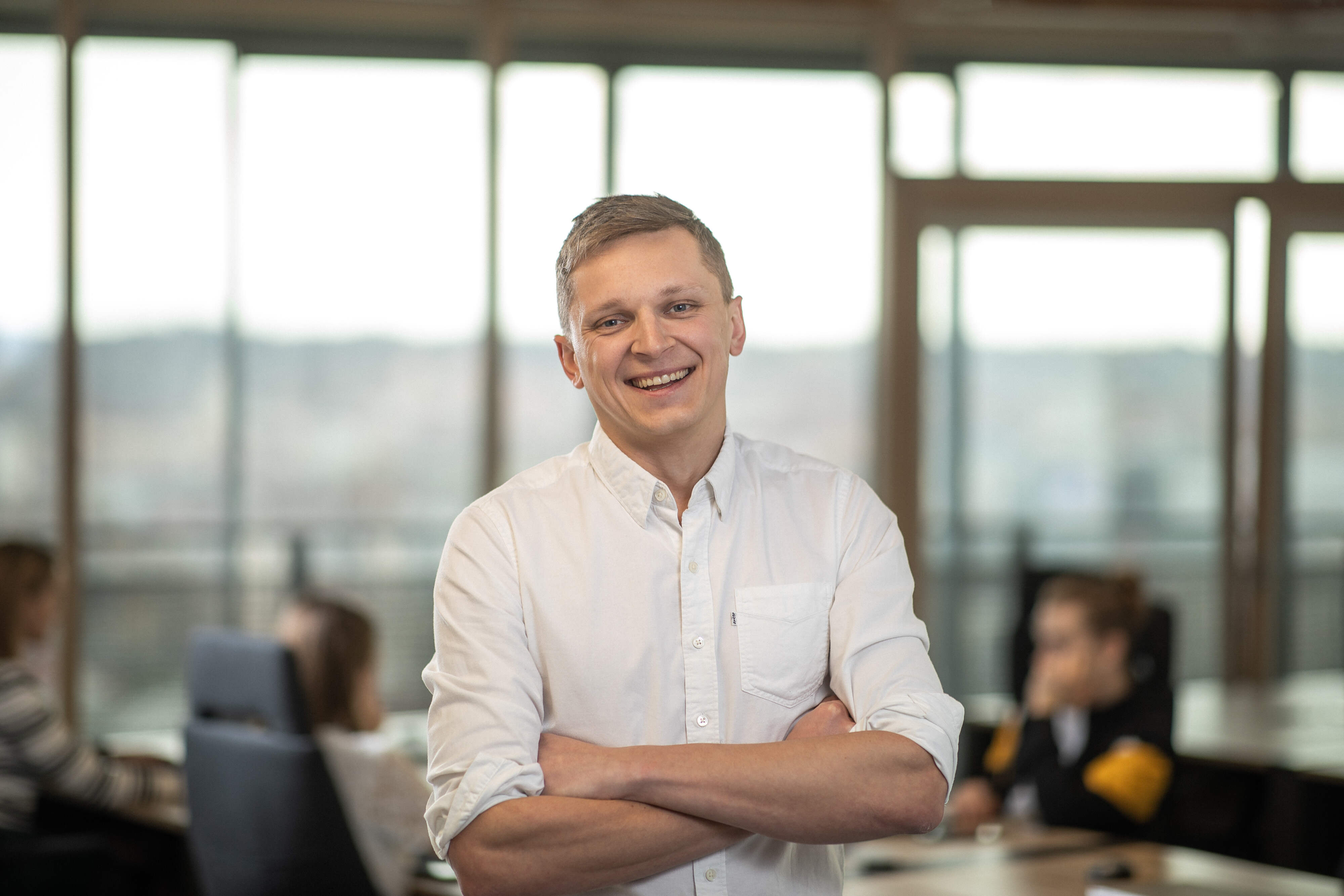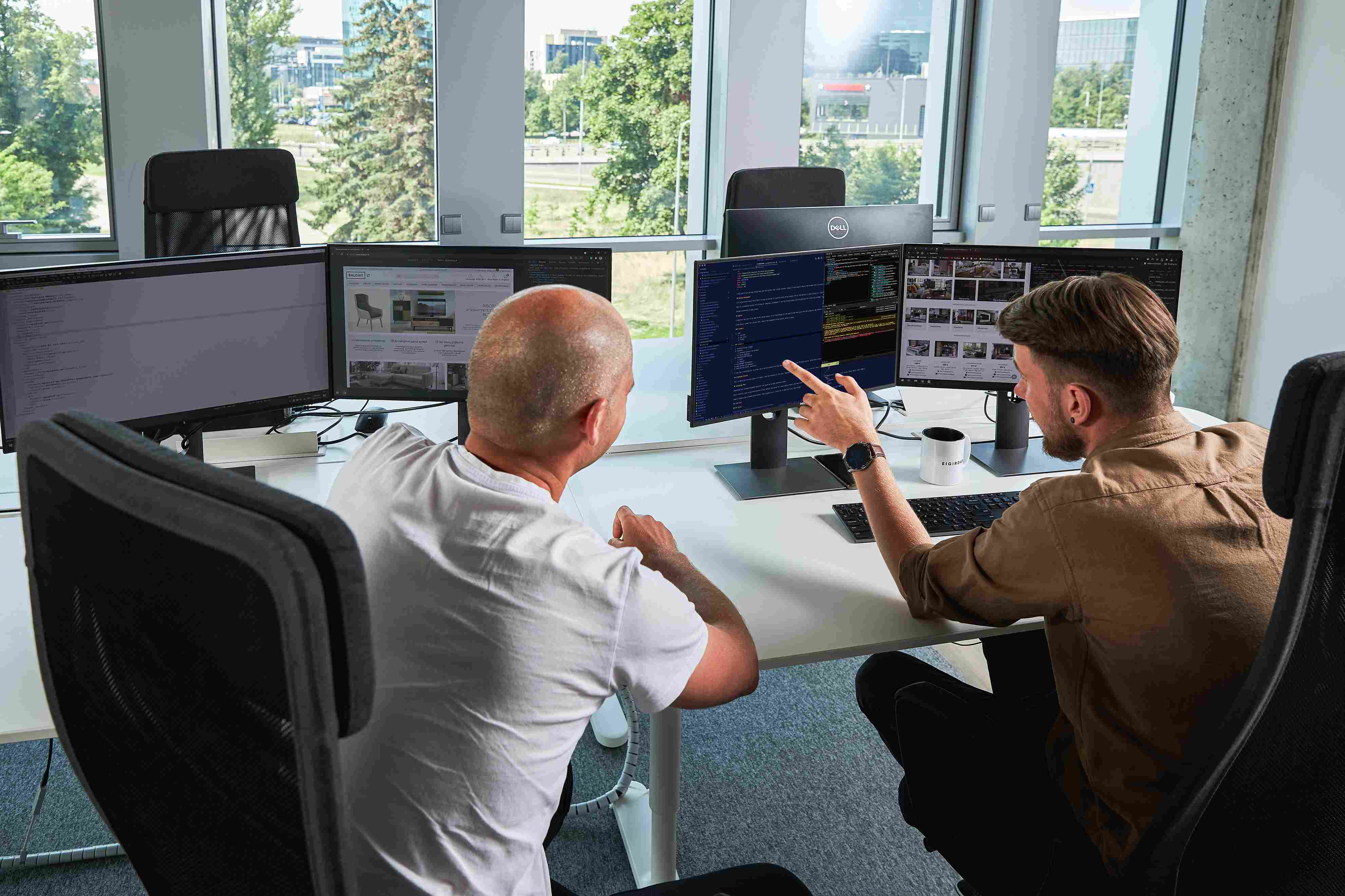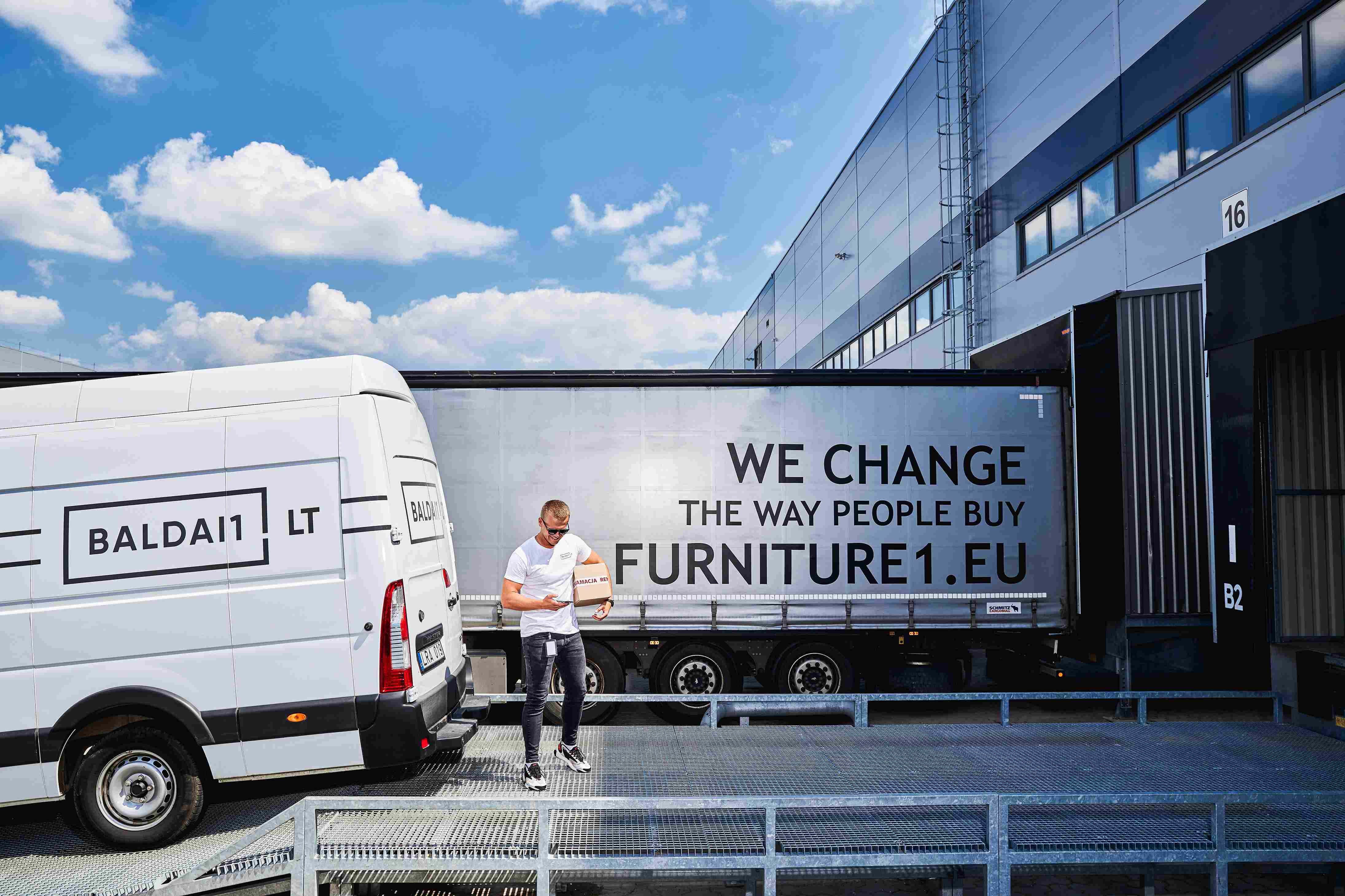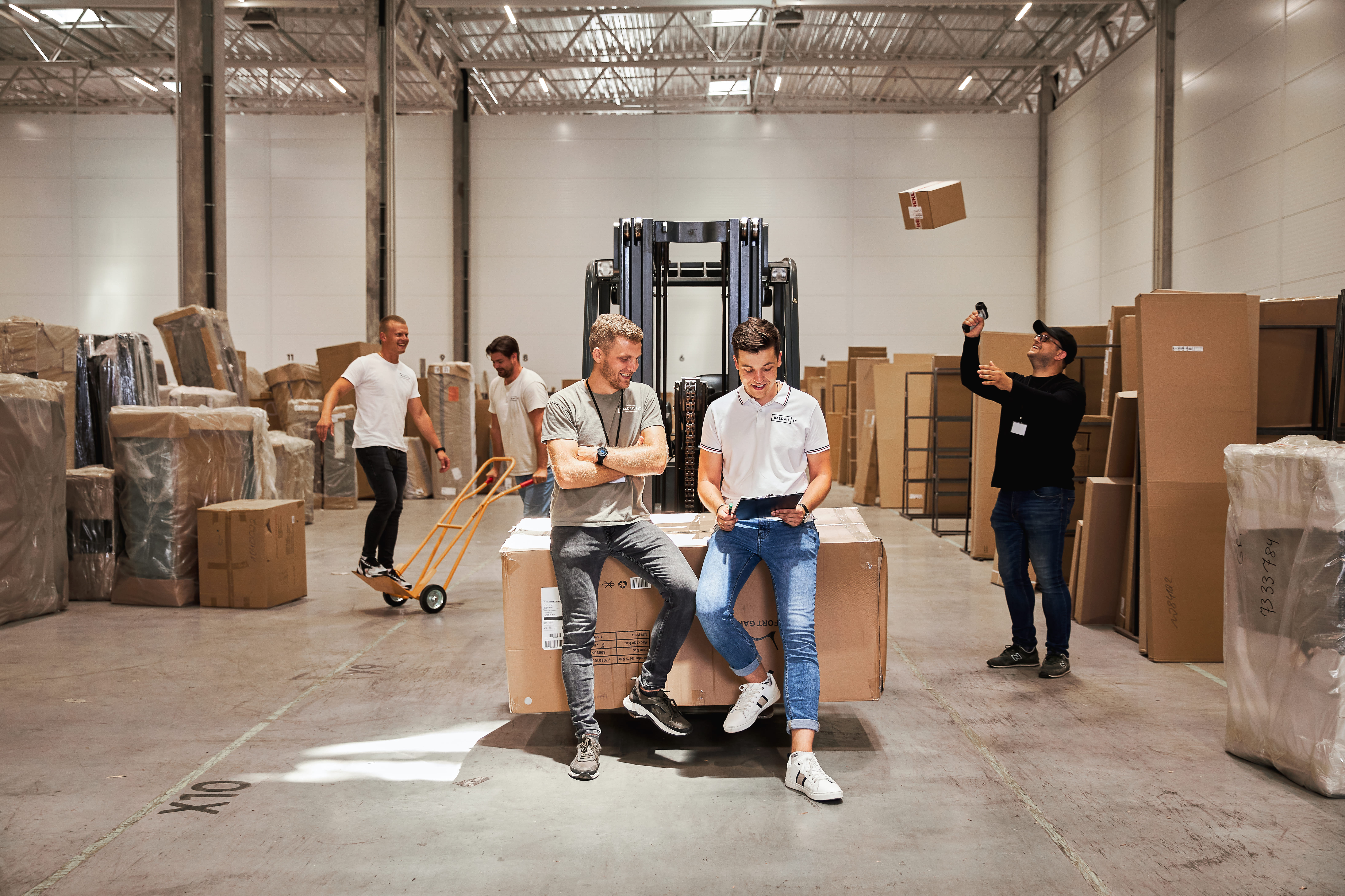


Today, Furniture1 is an e-commerce group with a 500-strong team spread out across 10 European countries. The technological solution developed by the startup facilitates data exchange between manufacturers, logistics terminals, and e-shops, as well as optimises delivery and customer experience.
For his part, Pijus Makarevičius became the model next-gen entrepreneur. The first employee on his team was a customer service rep – not a driver or loader, as would be usual. Besides a unique team-building style, his manner of talking is direct and open, and his approach to business development is based on values.
“We’ll see how much further we can go with this approach, namely – creating value and change without compromising on values, enthusiasm for work, and attitude towards clients. I estimate that we’re about 3-4 years away from unicorn status,” Pijus says.
- Furniture1 is a well-known startup and a profitable company group, which sounds even more impressive considering how you started out. Could you tell us a little about that?
- Back then I used to say – and still do now – that my profession is an “IT guy”. Many would probably find that funny and say that it was ages ago, but it really is how I got started. I was born in Šiauliai, where I worked for an IT retail store between the ages of 15 and 20. Since I was also interested in business, I had a variety of side projects, such as real estate management, selling CDs with open-source software at bookstores, and building websites and e-commerce stores. We also tried selling furniture, but it didn’t work out. Nonetheless, we did get plenty of calls, so I sensed an interesting opportunity there. Although hardly anyone was selling furniture online or cared about e-commerce at the time, I flagged it as something I might want to consider in the future.
That’s also the reason behind our simplistic name. The domain baldai.lt was already taken, while baldai1.lt was still available. After I placed an ad, we started getting calls and orders – and that’s how it all started, quite organically. In the first two years, we didn’t even give an explicit priority to this business. While Baldai1 was still a minor side-project, we also sold perfume, clothes, and even underwear online. However, I enjoyed the process of building an e-commerce store – going to warehouses, controlling large vehicles, and driving to Poland with a bunch of zloty I got from a currency exchange really appealed to me, a guy from Šiauliai. I felt like the head of a small dealership.

- How do you build a business during a crisis?
- Since, during the crisis of 2007–2009, the companies that suffered were those reliant on borrowing, I thought, “We’ll have to move slowly and work hard, but we’re not going into debt”. During the days, we’d do coding, and in the evenings, we’d gather up the same crew and go loading boxes at our warehouses. It’s illogical and bad for growth, but it suited us at the time. Decisions like this actually enabled us to grow organically.
That being said, each time period has its own rules. I don’t want to be a dinosaur that pretends to know it all. Especially not in the current situation, when we have a startup ecosystem and community. The conditions are completely different now.
- Is it true that, for the longest time, you not only loaded boxes, but also delivered parcels yourself? If so, why?
- Apart from genuinely finding this job charming, I did it because there were no reliable partners in logistics available. It was the very beginning of e-commerce, so no one even dreamed of high-quality delivery, especially of large parcels. A few years later, we realised there was real potential here, yet kept the same model going for another 3 years, because it was effective. Eventually, we built a team of 20-30 people, opened up an office, and I no longer had to sit behind the wheel myself.
- We should probably also distinguish between Furniture1 and Baldai1, the latter being well-known across Lithuania, and that we’re talking here of a technological solution, rather than just the regular sale of furniture. Is that correct?
- In foreign markets we’re known as Mēbeles1, Mööbel1, and the like – we simply adapt the name Baldai1 as needed, hire a team of customer service reps, open a few warehouses, and take control of logistics chains. In Lithuania, however, we’re developing a solution for data exchange under the brand Furniture1. Our goal is to digitise and optimise the entire logistics chain.
The products sold by the companies our group are quite large. So, if you have, say, a sofa that’s manufactured in Germany and sold to someone in Greece, the price of shipping a single item like that via a regular courier service provider can exceed the price of the sofa itself. And that’s exactly what Furniture1 is about – we’re developing a technological solution for dealing with these problems more effectively. In other words, faster, cheaper, and with lower environmental impact.
- Did you ever regret choosing specifically furniture as the centrepiece of business development?
- I like that we’re dealing with actual, physical items – we’re constantly handling large boxes, although we never open them to find out what they contain. All we really see is a code, an image, and some comments regarding who handled it and when. I’d say that only a handful of people in our 500-strong team have any real knowledge of furniture – the business is based on algorithms, which removes all consideration of what’s “beautiful” and what’s not.
We also work in other areas besides furniture. To this end, we’ve founded the WeChange Group and started investing in other startups – especially those related to e-commerce – sharing experiences, know-how, and lessons learned. Our aim is to “walk the walk” together and see the value we’ve managed to create at the end of the day. This year we’ve already invested in 6 different startups and now continue looking for ways to generate more value.

- Which investments do you see as currently the most promising? What should people be keeping an eye on?
- We tend to prioritise things most directly linked to our business, such as technology, e-commerce, logistics, and electric vehicles. Despite the e-commerce segment growing slower this year than SaaS or fintech, that’s where we can generate the most actual value.
- What major business lessons have your learned? What were your biggest mistakes?
- In my view, our least successful investments were internal, because we didn’t know how to stop. That’s also a personal issue of mine. For instance, we once burned through several million euros in Italy and yet, each month, we’d go, “Maybe just a little more?”. Sometimes it’s difficult for me to properly register a loss and pull out because, although inconvenient at the moment, it’s the right call in the long run. This is especially true when it’s not clear what has gone wrong and why the desired result isn’t forthcoming – when it feels like we haven’t learned any lesson. What I am happy about, though, is that despite all our mistakes, we’ve always stuck to our word given to partners. We’ve never compromised our reputation for short-term gain.
- I can see that you’re a leader who’s not afraid of admitting when he doesn’t know something. You also have a unique hiring approach – most of your managers had started out in the lowest positions, and for a long time you were hiring only inexperienced specialists, essentially newcomers. Why is that?
- That’s correct. My team knows my strengths and weaknesses, and I know theirs. In the beginning, the decision to hire newcomers was a practical one, because our employer value proposition was quite weak. Later on, it became a conscious one. If you have the right values, the rest can be learned on the job. Besides, many of the things we do are unique, and I like it when people around me grow – that’s how you create value. All our managers have come up the ladder, having first been drivers, customer service reps, and the like. It should also be noted that, oftentimes, when a specialist advances to a managerial position, we don’t have anyone to replace them with, but in the long run the benefits certainly outweigh the disadvantages.
- Today, many of those who are dreaming about their own startup or business imagine things in a radically different way. For instance, they often expect to delegate tasks early on, jump on the 4-hour workweek bandwagon, or dream of overnight success on investors’ money. What do you think about all of this?
The 4-Hour Workweek is an excellent book that I’d definitely put among my TOP 10 business reads. But can you build a unicorn by working 4 hours a day? You either have to be incredibly smart or just work a lot. Personally, I work a lot, but I’m also aware that not everyone can just “grind” for 16 hours/day. It’s also unnecessary.

- Let me put it differently – when did you stop working 16-hour days yourself?
- I’m not sure I have. Quick success is largely a myth – for an outside observer, it may look as though results have come on their own. Sometimes, however, knowledge and know-how only come through experience.
- Besides personal, which of your experiences have been the most beneficial? Have you ever asked yourself what kind of entrepreneur you wanted to be? Where have you learned what you now know?
- I just did tons of things and experimented. Working a lot generates more value, which then comes back to you. Apart from our financial goals, we strive to ensure the best experience for our clients. We focus on areas where both they and our team can achieve satisfaction. Incidentally, this also leads to higher profitability.
Since our product has been tangible from the very beginning, clients always saw the value right in front of their eyes and were happy to come back to us over and over. This allowed us to grow. For some people, working 16 hours/day is uncomfortable, but to me, it’s much more uncomfortable to be in debt. This is why I decided to work harder and longer but be relatively debt-free.
As for learning, I’m doing it to this day. I read books, watch lectures, YouTube videos. We have so much information readily available now that it seems like all questions have already been answered, so all that remains for us is to find it.
- Few people know this, but your lifestyle is not exactly a common one. As a seasoned traveller, even after coming back to Vilnius, you lived in hotels for over a year, with your day-to-day items packed into a couple of backpacks. Tell us more about that.
- My wife and I used to spend around six months in Lithuania, and the other six abroad. When repairs started in our neighbourhood and we got a warning that access to our home will be temporarily unavailable, we thought it was an interesting opportunity. We thought, “Since we enjoy living in hotels abroad, why not do the same in Vilnius?”. So, we packed our stuff and took off.
Upon coming back, we started changing places all the time – within approximately 19 months we tried about 70 different options. Sometimes we’d stay in one place for a day, other times – several weeks. This experiment taught me several lessons. Firstly, it made me realise how few things I really needed (a laptop, exercise gear, and some clothes). When you move from place to place every couple of days, you learn to pick only the essential ones, which makes life much easier. The second was that, with this kind of lifestyle, everywhere starts to feel like home, because you know that you’ve got nowhere else to go.
I think that people often have dreams they work hard to achieve and then realise that maybe it wasn’t for them, after all. Recognising that feels scary. I think it’s important to try as many things as you can to figure out what you really like, rather than just go towards some goal blindly. The same can be said for business. The amount of money you make correlates neither with happiness, nor with your well-being.
- You’ve recently publicly celebrated your role at the company becoming increasingly smaller. What comes next?
- It’s not that I want to step back altogether, but rather that I’m happy to see people growing in my team and our business becoming more independent. I now have the luxury of working only on tasks I enjoy or where I can generate the most value. Today, I do things that I love or find particularly useful around 95% of the time. And this is what gives me a real sense of meaning.
